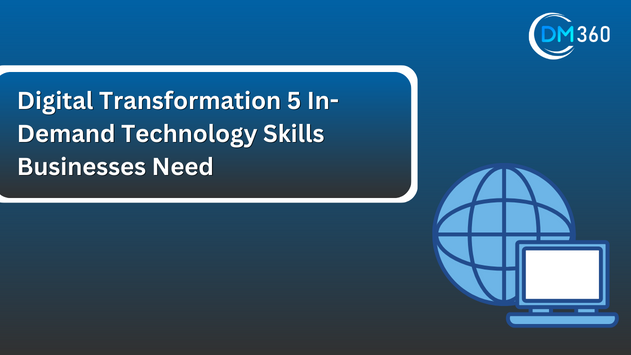Digital Transformation 5 In-Demand Technology Skills Businesses Need – A constantly changing environment due to technological advancement makes it crucial for any firm to adapt to Digital Technologies. Digital transformation is defined as the process of aligning digital technologies with different areas of operations and, thus, altering the ways companies interact with consumers, perform tasks, and enhance productivity. Thus, companies must prepare themselves to gain the necessary technology skills for the ongoing digital transformation.
Table of Contents
Toggle
What Is Digital Transformation?
Digital transformation can be described as the use of digital technologies across an organization to transform its operations and how it creates, captures, and delivers value to its stakeholders and customers. It goes beyond the process of acquiring new technologies; for them to be effective, it requires redesigning the business models, processes, and organizational cultures.
Digital transformation primarily revolves around improving productivity, flexibility, and customer value. Some of these include cloud computing, big data, artificial intelligence, the Internet of Things, and automation. All of these technologies can be utilized in decision-making, data processing, and effective and efficient customer relationships.
It can enhance effectiveness and productivity by rationalizing processes and expenses, speed up decision-making, and bring about innovative products or services for organizations. It is still changing, though, and that is why a mindset shift alongside a commitment to constant learning is called for. Today’s fast-growing, highly technological environment for businesses rewards organizations that adopt digital models.
5 In-Demand Technology Skills Businesses Need For Digital Transformation
Embracing the digital age is what it takes to keep up with a world that has adopted it. Five technology skills are in demand for this journey: cloud computing, artificial intelligence/machine learning, cybersecurity, Internet of Things/edge computing, and blockchain.
These skills can be used to boost productivity, enhance the satisfaction levels of customers and encourage creativity in dynamically changing business tech environments. In this context, businesses can secure a forward-looking position by establishing labour relations to build a competent workforce in these areas and address the challenges of digital evolution. In this article, we will unveil five technologies that any business must master to flourish in the modern world.
Data Analytics and Business Intelligence
It is an undeniable fact that digital transformation depends on data. Customer data is gathered from customer interactions, purchase orders, social media, and website analytics. Raw data are somewhat useful, though for several reasons. But raw data, as it stands, is not very useful. Data is of much more use when it has gone through rigorous processing. It becomes clear that while raw data is valuable, it is not sufficient to provide insights on its own.
Companies need to understand, analyze, and interpret data for their benefit through data analytics and business intelligence skills. Data analysts can clean large amounts of data, uncover patterns and, relationships between variables, and draw accurate conclusions from such findings. Easy to use dashboards and reports are ready sources to help decision makers with decision making and to also help in understanding the business environment.
Artificial Intelligence (AI) and Machine Learning (ML)
AI and ML have played a crucial role in automations, processes optimization and creating solution innovations. Examples of this would be the use of artificial intelligence in enhancing customer service through chatbots that provide immediate support. Machine learning algorithms can be used to target consumer communication with advertising and promotional information.
AI and ML can have an impact on a business by making certain processes more efficient, saving money and improving the quality of the final product to the customer. To make progress and integrate AI and ML technologies satisfactorily, qualified professionals are required.
Cybersecurity and Information Security
They become critical as the use of technology grows particularly in business organizations. Digital transformation solutions are making data protection a priority because of the increasing risk of cybercrimes and data leakage.
Specifically, information must be secured, data must be guarded, and the network must be defended from cyber threats. An II personnel is essential in putting good security measures into practice, identifying security weaknesses, and meeting legal standards of data protection.
The need to protect business information and retain customer confidence makes cybersecurity talent the surest bet for organizations operating in the era of connected devices and the IoT.
Cloud Computing
Storage and applications, including data, are currently hosted, administered, and retrieved from the cloud. Organizations can rely on their scalable and flexible solutions to respond effectively to certain needs and not use much of or waste resources.
AWS, Microsoft Azure, Google Cloud provide data storage and computing power, serverless computing. IT cloud experts can advise businesses on how their architecture and IT applications should be moved to and operated in the cloud, as well as provide security for the cloud environment.
Cloud computing and SEO Chicago help to save money while cutting bureaucracy and increasing efficiency; this lets companies freely develop and grow.
User Experience (UX) Design
The UX is an essential factor that impacts customer satisfaction and their preference for the digital services being offered today. It is a design discipline with the purpose and objectives of providing product and service design solutions that are easy to use, appealing to the eyes, or pleasing to the user.
Justified improvements in customer satisfaction lead to improved engagement with customers, improved likelihood of conversion and enhanced brand image. High level of competency in the identification of user and their requirements and in the creation of beautiful, easy to use intuitive interfaces on web based applications as well as mobile applications is also important for a UX designer to possess.
UX design creates competitive advantage and helps companies to strengthen their share in the market by building customers’ loyalty.
Blockchain Technology
Cryptocurrencies discovered in blockchain application, and now it used in many fields. These two characteristics improve business processes’ transparency, security and trust due to decentralized and immutability traits.
It is in industries such as finance, supply chain, health, and so on, that blockchain solutions can be applied, and this can only be done with the help of blockchain specialists, Smart Contract coders, and developers of decentralized applications (DApps).
SEO services Chicago Experts in this area will be especially important when the business world moves to consider blockchain possibilities.
To Wrap Up
The digital transformation of businesses is more than a buzzword; it is a fundamental shift that shapes their future.
Organizations must invest in technology skills and talent to thrive in the digital age. Data analytics and business intelligence enable informed decisions, while artificial intelligence and machine learning facilitate automation and innovation.
Cloud computing enables flexibility and scalability while protecting valuable data. The UX design process enhances customer experiences and builds brand loyalty.
Businesses can be successful by embracing these in-demand technology skills, staying ahead of the competition, and delivering exceptional customer value by embracing these skills. The businesses that adapt and evolve will emerge as industry leaders in the digital age, as digital transformation is an ongoing process.
FAQs
What is digital transformation, and why is it important for businesses today?
Digital transformation refers to the integration of digital technologies into all areas of a business, leading to fundamental changes in operations and value delivery. It helps businesses improve efficiency, enhance customer experiences, and remain competitive in a tech-driven market.
What are the top 5 in-demand technology skills businesses need for digital transformation?
The most sought-after skills include:
-
Data Analytics & Data Science
-
Cybersecurity
-
Cloud Computing
-
Artificial Intelligence (AI) & Machine Learning
-
Software Development & Automation
How can businesses upskill their workforce for digital transformation?
Businesses can upskill employees through online training platforms, certifications, hands-on workshops, and partnering with tech training providers. Encouraging a culture of continuous learning is also key to successful digital transformation.
Why is cloud computing crucial in the digital transformation journey?
Cloud computing offers scalable infrastructure, remote accessibility, cost savings, and enhanced data security. It enables businesses to deploy and manage digital tools more efficiently and supports real-time collaboration across teams.
How do AI and machine learning impact business operations?
AI and ML automate repetitive tasks, enhance decision-making with predictive analytics, personalize customer experiences, and improve operational efficiency. These technologies help businesses innovate and respond quickly to market demands.






